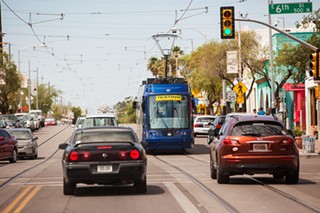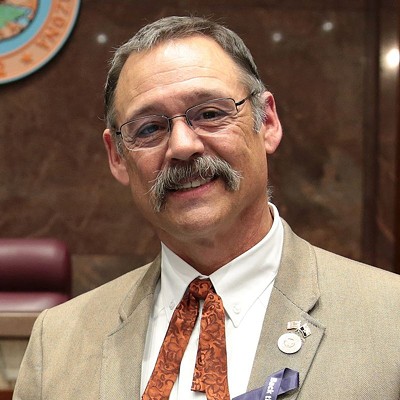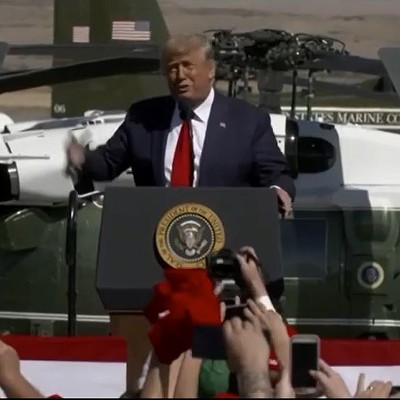The cost of the city of Tucson's transit system have continued to climb in recent years.
In the 2011 fiscal year, the city paid about $34.7 million out of its general fund to subsidize the transit system. In the current fiscal year, that number is closer to $42.7 million—an increase of about $8 million.
There are various factors driving that increase, including a decision by state lawmakers to divert lottery dollars that used to help with transit costs. But the bottom line remains the bottom line—and the cash-strapped city is having a hard time paying for many services, including transit.
It's important to note that public transit systems don't generally pay for themselves; in fact, on average, fares account for about 25 percent of the cost. In Tucson, that number has hovered around 23 percent in recent years.
Last spring, city staff tried to persuade council members to make some changes in the routes and increase fares, but the council put off changes until November. When November rolled around, council members said they wanted to wait until December. And last week, staff presented a proposal that would have increased the current "base fare" of $1.50—i.e., the non-discounted fare for a single ride on a normal bus route—by a dime in 2018, with 10-cent increases every two years after that so that fares would reach 2.10 a ride in 2028.
At the same time, various other fares—monthly passes, student passes, low-income passes and the like—would increase based on the so-called "base fare."
Staff projections showed that fare-box recovery would hit roughly 26 percent or 27 percent as a result of the changes.
Ward 6 Councilman Steve Kozachik made a motion to follow through with the staff recommendation, with the amendment that pushed back increases in some special fares until 2018. But his motion died for the lack of a second.
Kozachik said the council should have taken action.
"Transit does not stand alone in a budgetary vacuum," Kozachik said. "Every meeting I go to, people talk about funding roads. They talk about funding police and fire. The same people who are advocating for the economy bus fares—which I support—are also asking us to increase our funding for social services. We have an obligation to all of the commuity to fund all of these things appropriately."
But Ward 3 Councilwoman Karin Uhlich said she wants to know more about the options before committing to anything. She is hoping that the city's work with transit expert, Jarrett Walker will help a new vision emerge.
"What we'll get is clarity about how to prioritize the services—for example, where to protect 15-minute headways and where to allow them to go to 30 minutes without ultimately harming the regional system," Uhlich said.
Uhlich said she'd like to see the RTA plan approved by voters in 2006—which was funded by a half-cent sales tax and included road improvements, transit investments and the bulk of the local dollars for downtown's modern streetcar—go back before voters in 2017 to see if they want to increase the amount of money available for transit.
"We're turning so many important corners right now in transportation, awareness in climate change and clean-air issues," Uhlich says. "So I think the voters would like to see that package back in front of them. It's been 10 years and a lot has changed since then."
Councilwoman Regina Romero, who is seeking a third term representing Ward 1 next year, said that she hopes that after Walker has a chance to review the city's bus system, regional representatives and the community will be able to find "a unified consensus about the future of transit in our region."
Councilman Paul Cunningham, who is also seeking re-election to his Ward 2 seat next year, said that he didn't think it was necessary to rush into raising fares ahead of Walker's visit.
Mayor Jonathan Rothschild said he disappointed in the council's unwillingness to approve an increase in bus fares, but said he believed his colleagues were getting closer to making a decision.
"I thought the council could have been more aggressive in adopting the experts' recommendations," Rothschild said. "It would have saved us money and it would have helped the riders. ... I believe that there is a way we can protect low-income riders, protect economy riders—not raise those rates—but potentially raise rates for choice riders and then put that money back into the system."
He added that the long-term solution might be handing the bus system over to the Regional Transportation Authority.
"I think we're getting to the point that everybody agrees that in order to have a very good transit system, we ought to go to a regional transit authority," Rothschild said. "Ultimately, that's going to have to be the solution."


















